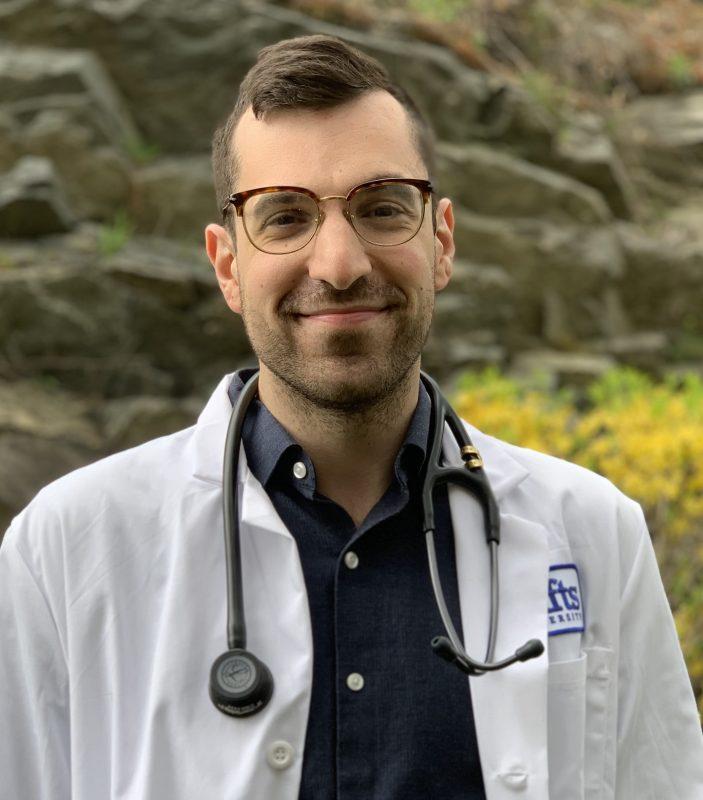-
About
- Leadership & Faculty
- News & Events
-
Admissions
-
Academics
- Graduate
- Advanced Clinical Training
- Continuing Education
-
Student Life
-
-
Accommodations
- Our Campus
-
Accommodations
- Graduate Resources
-
-
Research
-
Hospitals & Clinics
- Emergency Care
- Hospital Services
-
Community Outreach
- Volunteer
From Rodents to Monkeys, Veterinary Student Loves the Variety of Laboratory Animal Medicine
After starting out in neuropharmacology research, Curtis Rheingold discovered he was more interested in the animals than the research itself.

Curtis Rheingold’s path to veterinary medicine started in the laboratory. After obtaining his bachelor’s degree in neuroscience, he was conducting neuropharmacology research and planned to pursue a graduate degree in that field. But everything changed when Rheingold realized he was more interested in the animals than the research itself.
“I learned that there is an entire field of veterinary medicine that involves taking care of research animals. That’s what drove me to apply veterinary school,” Rheingold says. He was specifically interested in Cummings School of Veterinary Medicine at Tufts because it offers a program in Laboratory Animal Medicine.
Rheingold is graduating this semester with both a Doctor of Veterinary Medicine degree as well as a Master’s in Laboratory Animal Medicine. He says what interested him most about the Laboratory Animal Medicine specialty is that every day is different.
“I like the variety of species and the different types of research involved. Researchers can use whatever animal they want for the research, as long as it’s approved,” Rheingold explains. “It’s the entire spectrum of species from worms to horses. That’s what makes the field so interesting to me—you never know what kind of species you’ll work with next.”
In addition to his coursework and clinical rotations, Rheingold spent two summers working with laboratory veterinarians at research facilities. His first summer was spent at The Ohio State University, where he received an introduction to the field of laboratory animal medicine. He helped with daily rounds, attended regulatory meetings, oversaw the veterinary technicians and husbandry staff, and helped researchers with animal surgeries and other medical procedures.
“You’re there to help the research go as smoothly as possible while also being the ultimate spokesperson for the animals, making sure they’re taken care of and making sure everything is done to reduce any sort of stress they may experience,” Rheingold says.
For his second summer fellowship, Rheingold worked with the laboratory veterinarians at Massachusetts Institute of Technology. He focused mainly on a monkey species called marmosets, developing a research project aimed at reducing the amount of stress they experience while being handled. He also completed a study examining the prevalence of a certain bacteria in a colony of rhesus macaques, another species of monkey.
“A big part of the job is preventative medicine—making sure no diseases get into the facility,” Rheingold says. “You do everything you can to ensure the research is performed on animals that are healthy so there aren’t any confounding factors, such as disease.”
As a specialist in laboratory animal medicine, Rheingold has reflected deeply on the ethical considerations of using animals for research.
“If we could eliminate the need for animal research right now, I would happily choose a different specialty,” Rheingold says. But for now, animal research is still necessary and essential. The FDA requires drugs to be tested in at least two different animal species before approval, Rheingold explains.
“When you think about all the different medicines we use every day, the amount of influence animals have had over human health is immense,” Rheingold says. “I consider it a privilege to work with research animals, and my main priority is ensuring they are treated as well as possible.”
The overarching philosophy laboratory veterinarians use to guide their work is known as the “Three R’s” of animal research, Rheingold explains: Reducing the number of animals used, Replacing animals with non-animal models whenever possible, and Refining experiments to maximize animal welfare.
After graduation, Rheingold is planning to complete a small animal rotating internship at the BluePearl Pet Hospital in Langhorne, Pennsylvania, under the guidance of another Cummings alumni, Dr. Gary Puglia. For anyone thinking about applying to vet school—even if they are currently working in a completely different field—Rheingold offers encouragement.
“I think I’m a good example of how it’s never too late to apply,” Rheingold says. “I switched my whole career from research to working in a veterinary clinic, and it was tough, but worth it. It’s never too late, and you can make it happen.”
Department:
DVM Program